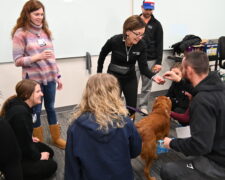MSN FAQs
What program tracks can I choose from?
Students may choose from full-time or part-time program tracks in the following areas:
• Family Nurse Practitioner (FNP)
• Nurse Educator (NE) – online only
• Psychiatric Mental Health Nurse Practitioner (PMHNP) – online only – See FAQ’s at the bottom of page
Both the FNP and NE tracks are available in full-time and part-time options, and offer a combination of online, face-to-face, and hybrid classes.
It’s been more than ten years since I took a Health Assessment and/or Statistics course, what do I need to do?
You will need to take and successfully pass a baccalaureate level course in the needed prerequisite course(s). Health assessment must be completed through a nationally accredited BSN program. A baccalaureate level statistics course, that includes descriptive and inferential statistics, may be taken through any accredited program. Bellin College does offer both of these classes. Please contact the MSN Program office with any questions.
Can I be employed and go to school at the same time?
Part-time and full-time programs are available. The programs are designed with some flexibility with online and on-campus courses, however students will find it difficult to work full-time and attend graduate school full-time. Most full and part-time FNP students find it is not possible to continue full-time employment when they begin their practicum courses due to the clinical time requirements. This is also true for part-time FNP students as the clinical time requirements increase towards the end of the program.
If I start full-time, can I switch to part-time?
It is encouraged that you prepare for full-time study and remain in your program, however sometimes that is not possible. Full-time students can reduce their plan to a part-time plan of study. Doing this will delay the prospective graduation date. However, due to prerequisite courses and course offerings, switching from part-time to full-time is very difficult and amended plans of study would be required.
Do I get to select my practicum sites?
All clinical placements are provided by the College. Students are not responsible for locating and securing practicum sites and preceptors. However, students may request a specific preceptor or practicum site. Requests should be made to the MSN Program Director and every effort will be made to accommodate those requests.
Does my nursing program curricula meet the requirements for licensure and certification in other states?
If you become a Bellin College student, you are responsible for checking program authorization and licensure requirements in your state of residence. Rules and regulations vary by state and are subject to change. If you move to a new state, you are responsible for ensuring our program is approved in your new state.
Board of Nursing Professional Licensure / Certification Requirements
Is financial aid available?
Limited financial aid is available, although the financial aid office at the college assists with loan processing. Information on the Free Application for Federal Student Aid (FAFSA) can be found on the website at http://www.fafsa.ed.gov/. The FAFSA must be on file for students to be considered for aid.
*We strongly encourage students to contact their employers for tuition assistance.
What does it take to get certified as an FNP after I complete my program?
The FNP curriculum prepares all graduates to meet the necessary requirements to take the Family Nursing Practitioner Certification Exam. The American Nurses Credentialing Center (ANCC) and the American Academy of Nurse Practitioners Certification Board (AANPCB) are the two certifying bodies for FNPs. The process of applying for certification will be reviewed prior to your graduation.
What does it take to get certified as a Nurse Educator after I complete my program?
The NE curriculum prepares all graduates to meet the necessary requirements to take the Nurse Educator Certification Exam through the National League for Nursing (NLN). The process of applying for certification will be reviewed prior to your graduation, though certification is not required for practice.
What is the cost of the program?
As costs may change, please refer to our online information regarding Tuition and Fees for the most recent updates.
Do I need a DNP (Doctorate of Nursing Practice) to become a nurse practitioner?
No. The American Association of Colleges of Nursing (AACN) has recommended that the DNP be the entry-level degree for all Advanced Practice Registered Nurses by 2015, however this is a recommendation, not a requirement. Many institutions continue to offer various NP programs at the MSN level.
Neither the American Nurses Credentialing Center (ANCC) nor the American Academy of Nurse Practitioners Certification Program (AANP-CP) require a DNP degree to be eligible for certification as a nurse practitioner. Currently, a MSN is the required degree to be a nurse practitioner.
Doctoral education (either PhD or DNP) may be desirable in the future for students for various reasons, but it is not required to practice as a certified FNP.
What is the application process for Bellin College MSN programs?
To apply, please submit the following:
• Bellin College of Nursing Graduate Admission Application
• Two Graduate Reference/Release Forms
• Official copies of all post-high school (e.g. college/university)
transcripts.
• Goal Statement
• Resume or curriculum vita
• Unencumbered Wisconsin nursing license
Psychiatric Mental Health Nurse Practitioner specific FAQ’s:
I have an MSN, Ph.D., or DNP, but I am not a certified advanced practice registered nurse (APRN). I want to become a PMHNP APRN. Is this possible?
Yes. Our post-graduate certificate (PGC) program is specifically for those with their MSN or terminal degree. The PGC prepares graduates to certify as a PMHNP. The plan of study would be individualized for you based on your MSN/PhD/DNP transcript.
Can I transfer credits or receive credit for prior learning?
The Graduate Nursing Program may accept up to 9 transfer credits of previous graduate-level coursework based on the following criteria:
- Coursework must have been completed within five years before admission to the program (or be approved by the Graduate Nursing Program Director and PMHNP Program Coordinator)
- Courses transferred must be comparable in scope, subject matter, and rigor to the Bellin College courses. The student must provide a course description and syllabus for any course requested for transfer.
- All courses transferred must meet the Bellin College grading and progression policy.
How many clinical hours do I need?
Clinical hours vary by program.
- The MSN program requires a minimum of 680 hours.
- The BSN-DNP clinical requirement is 1000 hours.
- The PGC is 500-680 hours, depending on a Gap Analysis and if you hold a current APRN certification in another specialty.
Do I need to find my own clinical site?
- No, the PMHNP Program Coordinator and the Clinical Affiliation Coordinator work with the student and clinical partners for placement.
- All preceptors and sites need approval from the PMHNP Program Coordinator and faculty facilitating the practicum.
Can I work while in the PMHNP program?
- Yes, our program is designed for working professionals. How much each student works is an individual decision. We offer a full-time and part-time option.
How many credits do I need to graduate?
- MSN = 48 credits
- BSN-DNP = 73 credits
- PMHNP PGC = 21 credits (GAP analysis required)
Do I need to come to Green Bay?
No, the PMHNP courses are offered online to accommodate working professionals. You do not need to come to campus to complete your degree or PGC program.
Where do I get more information?
Information can be found on the Bellin College website (www.bellincollege.edu) or by contacting Dr. Lori Kulju, the Graduate Nursing Program Director, at lori.kulju@bellincollege.edu.


